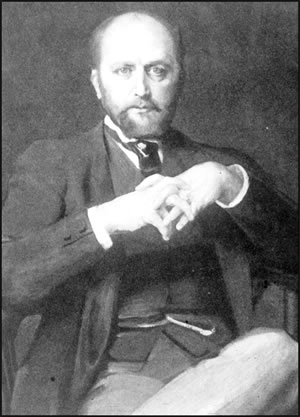
Henry James in 1889
Introduction to The Aspern Papers
Main Page | Henry James Literary Criticism | 19th-Century American Writers | 19th-Century Novelists | About LiteraryHistory.com
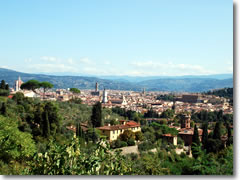
The view of Florence from Bellosguardo
Henry James wrote The Aspern Papers in 1887 while he was staying in Bellosguardo, "the forgotten hill of Florence," in a villa he was sharing unromantically with his friend and fellow author, Constance Fenimore Woolson (1840-1894). The arrangement was not an intimate one, much to the regret of Miss Woolson, who wished for a romantic connection with James. James was unaware of this, or pretended to be, or he was in denial. His biographer Leon Edel believes she might have spoken to him about her feelings on one occasion. James's attitude towards the middle-aged Miss Woolson may have influenced The Aspern Papers in the narrator's rejection of the middle-aged Miss Tina.
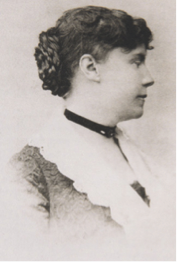
Constance Fenimore Woolson in 1887
As James explains in his 1908 Preface to the New York Edition, The Aspern Papers resulted from his learning the previous year that a fabulously scandalous figure from the Romantic period, Claire Clairmont, had been living until recently in Florence. Claire Clairmont was the pretty step-sister of Mary Godwin Shelley, Shelley's second wife. Claire and Mary were raised together after Mary Wollstonecraft's death, and Claire had a puzzling relationship with Shelley and Mary; she accompanied them when they eloped and lived with them in the years that followed. Perhaps in a spirit of rivalry with Mary, Claire also took a poet as a lover, becoming Lord Byron's mistress. There had long been rumors of Claire Clairmont's romantic and sexual relationship with Shelley as well as Byron, which now seems to be confirmed with the recent recovery of a piece of writing in Claire's own hand denouncing Shelley, Byron, and free love (see Daisy Hay's 2010 book, Young Romantics: The Tangled Lives of English Poetry's Greatest Generation.)
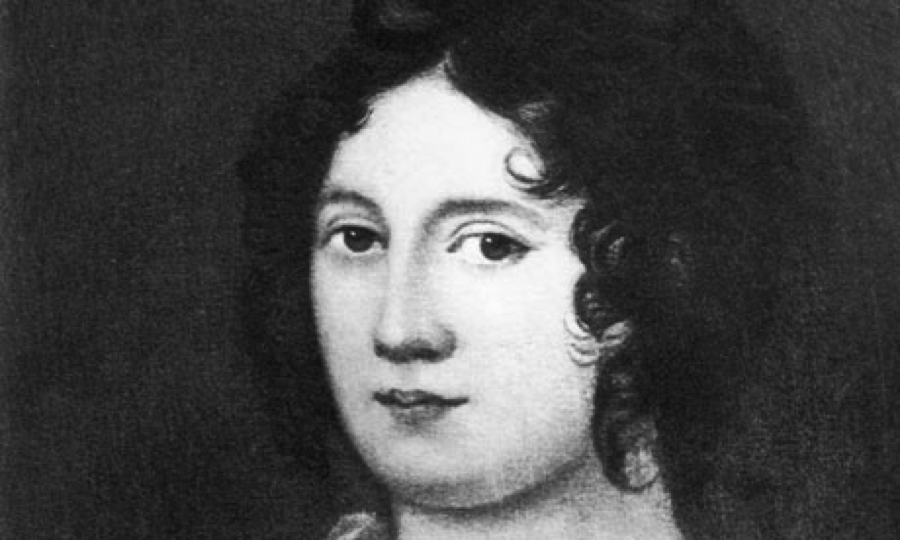
Claire Clairmont, the inamorata of Byron and Shelley
Claire Clairmont (1798-1879) had lived on in obscurity in Florence into her old age and had only just died, so Henry James could almost have met her. He was intrigued by the thought that his own life had overlapped that of someone from what seemed the distant romantic past. But he asks himself, in his 1908 Preface, whether it was an advantage that he had not met her, because of "that odd law which somehow always makes the minimum of valid suggestion serve the man of imagination better than the maximum." The writer is better off with fewer facts, the more freely to invent. James himself was a lover of Shelley's poetry. But had he had the opportunity to meet Claire Clairmont, he might have been like the narrator of the tale, an intrusive publishing scoundrel, and burdened with the facts. Not having ever seen her, he could be instead the writer who created her from his imagination.
In James's tale, an unnamed narrator, an editor, is obsessed with a great romantic poet, who becomes in James's story an American poet named Jeffrey Aspern. The setting is changed to romantic Venice rather than Florence. The plot is set in motion by the narrator's effort to find a way to approach the Claire Clairmont figure, called Juliana Bordereau here, so that he can get possession of any letters, papers, or pictures of Aspern she has. Juliana has fiercely refused a previous request for an interview. The narrator's plan is to use a false name and persuade her to rent him some rooms in her dilapidated pallazo, where the old lady lives quietly with her niece, the middle-aged Miss Tina. He vows that "there's no baseness I wouldn't commit for Jeffrey Aspern's sake." The way he will keep the two ladies from discovering his true purpose, he says, is "to make love to the niece."
In spite of these words, the narrator does behave more honestly towards Miss Tina than to pretend he's in love with her. Once he moves in, Miss Tina at first avoids him. When he finally encounters her one evening in the garden, she is so open and simple that he doesn't press his compliments on her, "for I had no wish to have it on my conscience that I might pass for having made love to her." The same evening he frankly admits to her that he is interested in Jeffrey Aspern and looking for materials. He persuades Miss Tina to help him, to the extent she can, at least to try to prevent Juliana from burning her papers before she dies.
Juliana, the mistress of a great poet, is a repulsive creature in the tale, avaricious for what money can be gotten from her lodger, dwelling on pecuniary matters in what limited conversation they have, and showing herself to be "a sarcastic, cynical, profane old woman." Miss Tina tells him she wants the money for her, planting the idea for some readers that Miss Tina is actually Juliana's daughter, by Jeffrey Aspern. The narrator expresses distress at Juliana's great interest in how much rent he will pay, but he himself has precise ideas about how much things should cost. He is shocked by her actual figure, a thousand francs a month. He knows there are many old palaces in Venice where he could rent the whole place for a thousand francs a year. The narrator has the middle-class realist's solid grasp of the purchasing power of his money combined with the upper-class manner of not showing a concern about expense. The money conversation becomes completely forthright some months later, when Juliana proposes that he renew his rental. When she asks him how much he would be willing to pay, he finds the question excruciating and is tempted to exclaim, "Don't Juliana; for his sake, don't!" But instead they descend into a conversation bickering over the rent.
Juliana's greed for the narrator's gold matches his own greed for her papers, so frequently expressed to poor Miss Tina. In the climactic scene, the narrator secretly enters Juliana's rooms one night when she is ill to search for her precious papers. She catches him in the act of bending over her cabinet, contemplating theft. The shock of this encounter leads to her death a few days later.
In the final chapter, the narrator returns to the palazzo after a tactful absence and learns Juliana has died. Miss Tina has saved her papers but does not think she is allowed to show them to the narrator. Instead, she gives him the miniature portrait of Jeffrey Aspern that Juliana owned. In their talk that follows, the consequences of the narrator's friendly behavior towards the lonely and unattractive Miss Tina gradually become clear to him, and his efforts to deny his predicament turn almost comical. Or so it would seem to Jeffrey Aspern, whose portrait he finds himself staring at during the embarrassing scene, hoping for help. It seems to him Aspern is amused that he has "got into a pickle for him," and is saying "get out of it as you can, my dear fellow!" From the Byronic perspective the entire plot belongs to opéra bouffe: a comic character--a literary editor, a would-be Don Juan--tries to trick an old lady so that he can get his hands on some papers, while she is trying to get his money from him and trick him into marrying her daughter. He gets what he deserves!
But for the narrator and Miss Tina, the scene they are in is awkward and painful. Slowly and timidly she moves the conversation in the direction of what she wants, and slowly he becomes aware of where it is heading, trying at the same time not to be, or not to show he is. Miss Tina eventually suggests the arrangement that would make it possible for her in good conscience to share her deceased aunt's papers with him--if he were a "relation." When he can no longer pretend not to understand, he registers a series of reactions to her and the situation. First, he is profoundly embarrassed, and silent at the moment he should speak, but he adds, "my countenance was not set as a stone, it was also full of compassion. It was a comfort to me a long time afterwards to consider that she couldn't have seen in me the smallest symptom of disrespect." But Miss Tina presses her point, "I'd give you everything, and she'd understand," she says. At this point the narrator reacts with horror, stammering "It wouldn't do, it wouldn't do!" and vanishes from the scene. His thoughts now are cruel and self-justifying:
"What in the name of the preposterous did she mean if she didn't mean to offer me her hand? That was the price--that was the price! And did she think I wanted it, poor deluded infatuated extravagant lady? . . . . I had been as kind as possible because I really liked her; but since when had that become a crime where a woman of such an age and such an appearance was concerned?"
The narrator's third reaction is a change of heart; he thinks perhaps he can still save his goods without marrying Miss Tina, or even, when he sees her the next day, and she is looking resigned and forgiving and almost beautiful, thinking perhaps he could marry her. But he learns that by now she has burned the papers. She knew she had been rejected. She turns her back and leaves the room. In the end, the narrator is left only with the portrait of Aspern, hanging above his writing table.
It would be good to think, if there is anything of James's dealings with Constance Fenimore Woolson in The Aspern Papers, that he treated her with the gentleness that was part of the narrator's response to Miss Tina. Six years after he wrote this tale, Miss Woolson died in Venice, alone, just after Christmas, probably a suicide. She had been an important friend and James really did like her. He was devastated by her death, especially the manner of it, and helped her family generously for the rest of his life.
Jan Pridmore
Cambridge, June 2015
Quotations above are from The Aspern Papers and Other Stories, ed. Adrian Poole, Oxford World's Classics, which is based on James's New York Edition of 1908
"And the sad truth which hovers o'er my desk
Turns what was once romantic to burlesque"
(Don Juan, Canto IV)
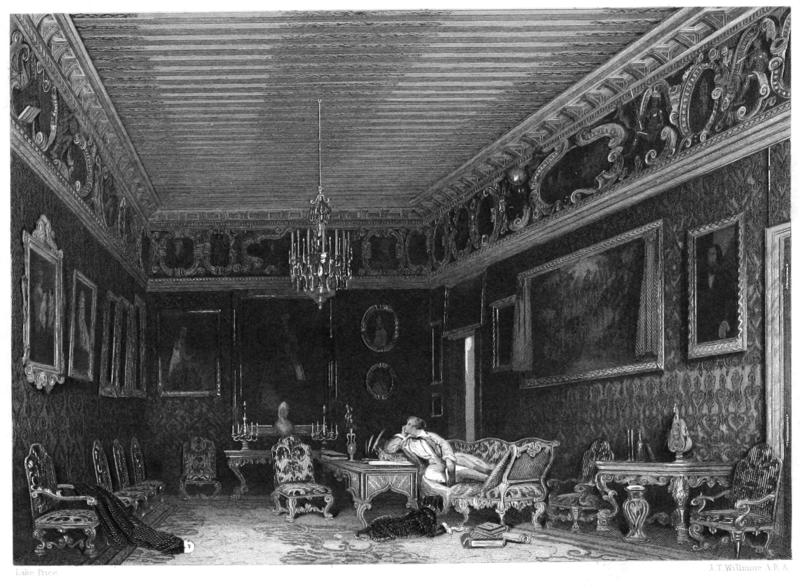
Byron in the Palazzo Mocenigo, Venice. Engraved from a painting by William Frederick Lake Price
Lord Byron arrived in Venice in November 1816. In late 1817 he moved to the Palazzo Mocenigo, along with his manservant, his mistress and his menagerie. During his three-year stay in Venice he wrote Canto IV of Childe Harold's Pilgrimage, his "Ode on Venice," "Beppo," and the first part of Don Juan.
Main Page | Henry James Literary Criticism | 19th-Century American Writers | 19th-Century Novelists | About LiteraryHistory.com
